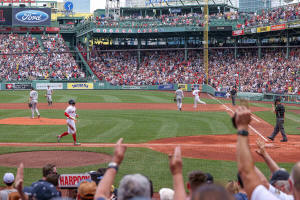Knocked down by a pandemic, baseball gets back up in America
 Send a link to a friend
Send a link to a friend
 [July 01, 2021]
By Lawrence Delevingne and Howard Schneider [July 01, 2021]
By Lawrence Delevingne and Howard Schneider
BOSTON/WASHINGTON (Reuters) - With the coronavirus at bay and the
dreaded New York Yankees in town, the 37,000 screaming, mostly
maskless Major League Baseball fans of the hometown Boston Red Sox
finally had something to hate more than the pandemic.
After limits on attendance ended at 109-year-old Fenway Park in late
May, the Red Sox drew middling crowds in the low 20,000s until the
longtime rival Yankees made Friday, June 25, the stadium's first
sellout since the fall of 2019.
"Fenway's back, definitely," said Matt Nelson, 29, who in swigging a
beer with his father Mike before a June 28 game against the Kansas
City Royals, presented an idyllic image of a normal summer for
America's national pastime.
How normal?
No-masks normal, a blessing in the 93-degree Fahrenheit (34 Celsius)
heat, with evidence also developing of a retail rebound among the
businesses that collect near Fenway and other sports arenas.
But not yet a full recovery.
Despite the buoyant mood at the Yard House bar and restaurant near
Fenway, "it's sad," said Mike Nelson, noting that nearby Boston Beer
Works remained closed while Bar Louie's space was for rent.
Both are casualties of a health crisis and recession that exacted a
toll even on prime real estate like Brookline Avenue near one of the
country's most fabled sports venues.

'THEY WANT TO SPEND MONEY'
Still, things are heading in the right direction as the impact of
vaccinations erases the remaining pandemic restrictions and promises
a torrent of spending on activities that have been off limits for a
year.
Last summer Major League Baseball had not even started its season on
July 4 due to the pandemic, and when a truncated season did begin on
July 23 no fans were allowed.
Vaccinations have since driven case rates so low that all of the
league's U.S. ballparks will be open at full capacity by July 5,
earlier than league officials expected when the season opened on
April 1 with 20% attendance limits in most places.
MLB chief revenue officer Noah Garden said as the season opened he
thought it was "50-50 at best" that restrictions would be gone this
fast.
Now, noting a 50,000-plus crowd at a recent Los Angeles Dodgers
game, he said he was cautiously optimistic league-wide attendance
would match or surpass 2019 averages for the second half of the
season. Fans, meanwhile, are spending more money inside the stadiums
to update team hats and other gear.
"In April we all recognized there was pent-up demand," Garden said.
"It has just accelerated. ..It is not only people wanting to get out
- it is a year since they have been out. ..They want to spend
money."
Ticket sales have "begun to return to pre-pandemic levels. We are
seeing this trend continue across all of our remaining games," said
Mike Carney, the Washington Nationals executive vice president of
business operations and strategy.
League-wide game attendance https://tmsnrt.rs/3fryedF for the seven
days through June 29 was about 86% of the league-wide average for
2019, evidence there is room for the rebound to grow.
[to top of second column] |

Boston, Massachusetts, USA; Boston Red
Sox third baseman Rafael Devers (11) hits a home run during the
first inning against the New York Yankees at Fenway Park. Mandatory
Credit: Paul Rutherford-USA TODAY Sports

That assumes the pandemic remains
under control. Case counts have stopped declining with the emergence
of a more easily spread variant, and the pace of vaccinations has
slowed and remains low in some states.
Signs are nonetheless encouraging that people are still willing to
pay to stand and sit next to strangers.
The one stadium that has allowed full attendance since April 1, the
Texas Rangers' Globe Life Field, has exceeded its 2019 average
attendance through May and June despite a losing,
last-in-its-division record.
"Venue operators did their due diligence and homework,"
accommodating social distancing rules at first, moving to
contactless entry and payments, and making other changes, said
Patrick Rishe, director of the sports business program of the Olin
Business School at Washington University in St. Louis. "They knew
that one of the things they had to fight was fan aversion to placing
yourself in harm's way."
Attendance at basketball, hockey and other arenas is showing the
same, he said.
'PRETTY MUCH BACK'
Slowly, people are returning to retail zones dependent on events.
The U.S. gymnastic trials in St. Louis, for example, sparked a
sellout weekend for downtown hotels. Cellphone data from analytics
firm Unacast shows foot traffic in areas around Fenway, St. Louis's
Busch Stadium, and Washington, D.C.'s Nationals Park still low
compared to 2019, but edging higher.
(Graphic: Retail traffic around stadiums: https://graphics.reuters.com/HEALTH-CORONAVIRUS/USA-MLB/oakpedabrvr/chart.png)
At the Red Sox Corner Store near Fenway on Monday night, manager
Terry McCann said souvenir sales rivaled those of the 2018 World
Series title season.
"We are pretty much back at pace," McCann said.
The nearby Wahlburgers restaurant on Brookline Avenue had a
30-minute game-night wait for a table. That was fine by Emily Mayer,
42. Having previously limited her time in public despite being
vaccinated, she felt seeing a Red Sox game in person was "worth it"
in terms of the extra risk.
"It definitely feels good being around people," Mayer said.

Patty Paulauski, the restaurant manager, would second that.
She estimated the restaurant's sales had been about 20% below 2019
levels, but the past weekend showed the summer's promise.
"Red Sox-Yankees? That helps, oh yeah," she said. "Business is
definitely picking up."
(Reporting by Lawrence Delevingne in Boston and Howard Schneider in
Washington; Writing by Howard Schneider; Graphics design by Chris
Canipe; Editing by Dan Burns and Howard Goller)
[© 2021 Thomson Reuters. All rights
reserved.]
Copyright 2021 Reuters. All rights reserved. This material may not be published,
broadcast, rewritten or redistributed.
Thompson Reuters is solely responsible for this content.
|